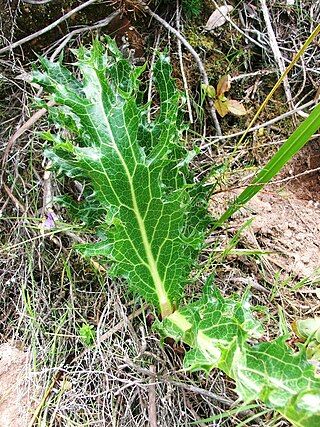
Psoralea is a genus in the legume family (Fabaceae) with over 60 closely related species native to southern Africa. In South Africa they are commonly referred to as fountainbush (English); fonteinbos, bloukeur, or penwortel (Afrikaans); and umHlonishwa (Zulu).

Agathosma is a genus of about 140 species of flowering plants in the family Rutaceae, native to the southern part of Africa. Common names include Buchu, Boegoe, Bucco, Bookoo and Diosma. Buchu formally denotes two herbal species, prized for their fragrance and medicinal use despite their toxicity. In colloquial use however, the term is applied to a wider set of fragrant shrubs or substitutes.

Heliophila is a genus of flowering plants in the family Brassicaceae. Members of this genus are either annuals or perennials and some are popular as ornamental plants. Endemic to southern Africa, the majority of the approximately 80 species grow in South Africa, particularly the Cape Floristic Region, while a few extend into the Namib Desert.

Melolobium is a genus of 15 species of flowering plants belonging to the family Fabaceae. It is native to southern Africa, where it is found in south and east Namibia, southwest Botswana, and most of South Africa.

Coleonema is a genus of flowering plants in the family Rutaceae. The eight known species are all from the western Cape Province of South Africa. In Australia, where they are cultivated as garden ornamentals, they are often referred to as Diosma, a different genus in the same family.

Argyrolobium is a genus of flowering plants in the family Fabaceae. It belongs to the subfamily Faboideae. Members of this genus are found in Africa and south Asia.

Hermannia is a genus of flowering plants in the mallow family, Malvaceae. It comprises at least 65 species with many more species as yet unresolved.
Wiborgiella is a genus of flowering plants in the family Fabaceae. It belongs to the subfamily Faboideae.
Diosma is a genus of flowering plants in the family Rutaceae, native to Cape Provinces of South Africa. The genus was first described by Carl Linnaeus in 1753.
Acrosanthes is a genus of flowering plants in the family Aizoaceae. It is native to Southern Africa.
Teedia is a genus of flowering plants belonging to the family Scrophulariaceae.

Lichtensteinia is a genus of flowering plants belonging to the family Apiaceae. It is also the only genus in the tribe Lichtensteinieae, subfamily Apioideae.
Notobubon is a genus of flowering plants belonging to the family Apiaceae.
Polemanniopsis is a genus of flowering plants belonging to the family Apiaceae.
Marlothistella is a genus of flowering plants belonging to the family Aizoaceae.
Neesenbeckia is a monotypic genus of flowering plants belonging to the family Cyperaceae. The only species is Neesenbeckia punctoria(Vahl) Levyns.
Indigofera glaucescens is a species of flowering plant in the family Fabaceae, native to the Cape Provinces of South Africa. It is consumed by common warthogs.
Hermas is a genus of flowering plant in the family Apiaceae, native to Cape Provinces of South Africa.
Deverra is a genus of flowering plant in the family Apiaceae, native from northern Africa to the Arabian Peninsula and Iraq, and to south tropical and southern Africa. The genus was first described by Augustin de Candolle in 1829.







